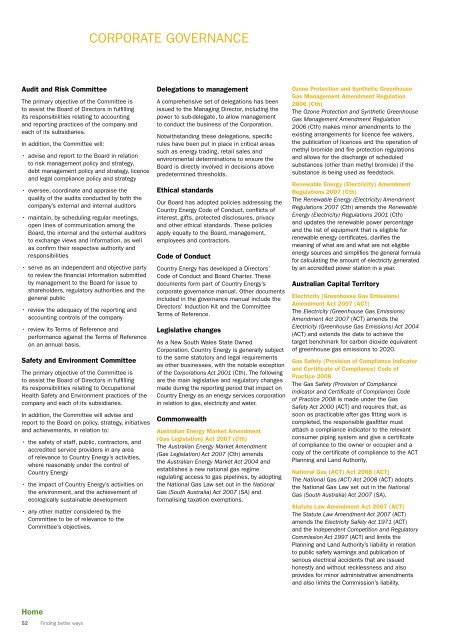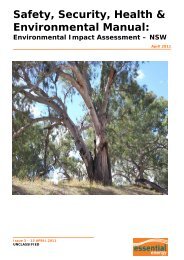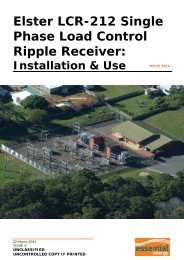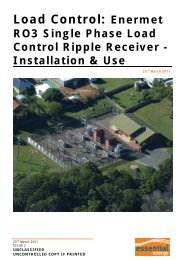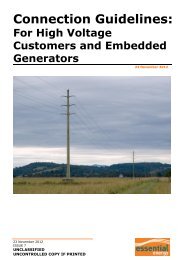Operational Reporting - Essential Energy
Operational Reporting - Essential Energy
Operational Reporting - Essential Energy
You also want an ePaper? Increase the reach of your titles
YUMPU automatically turns print PDFs into web optimized ePapers that Google loves.
CORPORATE GOVERNANCE<br />
Audit and Risk Committee<br />
The primary objective of the Committee is<br />
to assist the Board of Directors in fulfilling<br />
its responsibilities relating to accounting<br />
and reporting practices of the company and<br />
each of its subsidiaries.<br />
In addition, the Committee will:<br />
<br />
to risk management policy and strategy,<br />
debt management policy and strategy, licence<br />
and legal compliance policy and strategy<br />
<br />
quality of the audits conducted by both the<br />
company’s external and internal auditors<br />
<br />
open lines of communication among the<br />
Board, the internal and the external auditors<br />
to exchange views and information, as well<br />
as confirm their respective authority and<br />
responsibilities<br />
<br />
to review the financial information submitted<br />
by management to the Board for issue to<br />
shareholders, regulatory authorities and the<br />
general public<br />
<br />
accounting controls of the company<br />
<br />
performance against the Terms of Reference<br />
on an annual basis.<br />
Safety and Environment Committee<br />
The primary objective of the Committee is<br />
to assist the Board of Directors in fulfilling<br />
its responsibilities relating to Occupational<br />
Health Safety and Environment practices of the<br />
company and each of its subsidiaries.<br />
In addition, the Committee will advise and<br />
report to the Board on policy, strategy, initiatives<br />
and achievements, in relation to:<br />
<br />
accredited service providers in any area<br />
of relevance to Country <strong>Energy</strong>’s activities,<br />
where reasonably under the control of<br />
Country <strong>Energy</strong><br />
<br />
the environment, and the achievement of<br />
ecologically sustainable development<br />
<br />
Committee to be of relevance to the<br />
Committee’s objectives.<br />
Delegations to management<br />
A comprehensive set of delegations has been<br />
issued to the Managing Director, including the<br />
power to sub-delegate, to allow management<br />
to conduct the business of the Corporation.<br />
Notwithstanding these delegations, specific<br />
rules have been put in place in critical areas<br />
such as energy trading, retail sales and<br />
environmental determinations to ensure the<br />
Board is directly involved in decisions above<br />
predetermined thresholds.<br />
Ethical standards<br />
Our Board has adopted policies addressing the<br />
Country <strong>Energy</strong> Code of Conduct, conflicts of<br />
interest, gifts, protected disclosures, privacy<br />
and other ethical standards. These policies<br />
apply equally to the Board, management,<br />
employees and contractors.<br />
Code of Conduct<br />
Country <strong>Energy</strong> has developed a Directors’<br />
Code of Conduct and Board Charter. These<br />
documents form part of Country <strong>Energy</strong>’s<br />
corporate governance manual. Other documents<br />
included in the governance manual include the<br />
Directors’ Induction Kit and the Committee<br />
Terms of Reference.<br />
Legislative changes<br />
As a New South Wales State Owned<br />
Corporation, Country <strong>Energy</strong> is generally subject<br />
to the same statutory and legal requirements<br />
as other businesses, with the notable exception<br />
of the Corporations Act 2001 (Cth). The following<br />
are the main legislative and regulatory changes<br />
made during the reporting period that impact on<br />
Country <strong>Energy</strong> as an energy services corporation<br />
in relation to gas, electricity and water.<br />
Commonwealth<br />
Australian <strong>Energy</strong> Market Amendment<br />
(Gas Legislation) Act 2007 (Cth)<br />
The Australian <strong>Energy</strong> Market Amendment<br />
(Gas Legislation) Act 2007 (Cth) amends<br />
the Australian <strong>Energy</strong> Market Act 2004 and<br />
establishes a new national gas regime<br />
regulating access to gas pipelines, by adopting<br />
the National Gas Law set out in the National<br />
Gas (South Australia) Act 2007 (SA) and<br />
formalising taxation exemptions.<br />
Ozone Protection and Synthetic Greenhouse<br />
Gas Management Amendment Regulation<br />
2006 (Cth)<br />
The Ozone Protection and Synthetic Greenhouse<br />
Gas Management Amendment Regulation<br />
2006 (Cth) makes minor amendments to the<br />
existing arrangements for licence fee waivers,<br />
the publication of licences and the operation of<br />
methyl bromide and fire protection regulations<br />
and allows for the discharge of scheduled<br />
substances (other than methyl bromide) if the<br />
substance is being used as feedstock.<br />
Renewable <strong>Energy</strong> (Electricity) Amendment<br />
Regulations 2007 (Cth)<br />
The Renewable <strong>Energy</strong> (Electricity) Amendment<br />
Regulations 2007 (Cth) amends the Renewable<br />
<strong>Energy</strong> (Electricity) Regulations 2001 (Cth)<br />
and updates the renewable power percentage<br />
and the list of equipment that is eligible for<br />
renewable energy certificates, clarifies the<br />
meaning of what are and what are not eligible<br />
energy sources and simplifies the general formula<br />
for calculating the amount of electricity generated<br />
by an accredited power station in a year.<br />
Australian Capital Territory<br />
Electricity (Greenhouse Gas Emissions)<br />
Amendment Act 2007 (ACT)<br />
The Electricity (Greenhouse Gas Emissions)<br />
Amendment Act 2007 (ACT) amends the<br />
Electricity (Greenhouse Gas Emissions) Act 2004<br />
(ACT) and extends the date to achieve the<br />
target benchmark for carbon dioxide equivalent<br />
of greenhouse gas emissions to 2020.<br />
Gas Safety (Provision of Compliance Indicator<br />
and Certificate of Compliance) Code of<br />
Practice 2008<br />
The Gas Safety (Provision of Compliance<br />
Indicator and Certificate of Compliance) Code<br />
of Practice 2008 is made under the Gas<br />
Safety Act 2000 (ACT) and requires that, as<br />
soon as practicable after gas fitting work is<br />
completed, the responsible gasfitter must<br />
attach a compliance indicator to the relevant<br />
consumer piping system and give a certificate<br />
of compliance to the owner or occupier and a<br />
copy of the certificate of compliance to the ACT<br />
Planning and Land Authority.<br />
National Gas (ACT) Act 2008 (ACT)<br />
The National Gas (ACT) Act 2008 (ACT) adopts<br />
the National Gas Law set out in the National<br />
Gas (South Australia) Act 2007 (SA).<br />
Statute Law Amendment Act 2007 (ACT)<br />
The Statute Law Amendment Act 2007 (ACT)<br />
amends the Electricity Safety Act 1971 (ACT)<br />
and the Independent Competition and Regulatory<br />
Commission Act 1997 (ACT) and limits the<br />
Planning and Land Authority’s liability in relation<br />
to public safety warnings and publication of<br />
serious electrical accidents that are issued<br />
honestly and without recklessness and also<br />
provides for minor administrative amendments<br />
and also limits the Commission’s liability.<br />
Home<br />
52 Finding better ways


